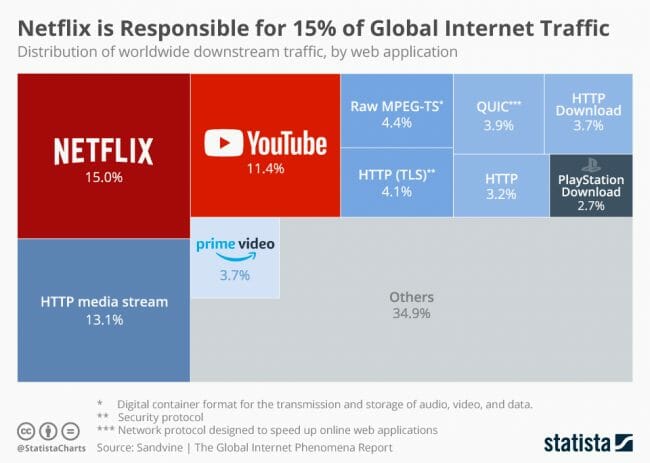Silicon Valley Begged for Government Intervention in Their Industry, and They May Soon Get It Good and Hard
Readers of this blog know that I have always been skeptical of the value of net neutrality rules. I see the Internet just like any other vertical value chain with multiple players, which we might oversimplify as content providers who hand off to bandwidth providers to get in front of the customer. Nearly every industry has these vertical value chains with multiple players -- think Coke and Pepsi fighting for floor space and margins through Wal-Mart. What is amazing to me is how the large content streamers, particularly Google, Netflix and Facebook, have somehow convinced the public that the whole future of the Internet depends on the government hamstringing the bandwidth providers in their relationship with the content producers.
When Youtube wants to stream at 4K rather than 1080p, the majority of the instractructure hit is on the bandwidth provides, and Google/Youtube wants that bandwidth to be there but does not want to have to pay for any of it. That is why these companies are the main supporters of net neutrality, but they are smart enough not to say this, but to instead flog some mythology that bandwidth providers might block or discriminate against certain providers. Even supporters of this meme are forced to agree that it is wholly hypothetical, that no one can really point to any good examples of it happening (I have always suspected that general public hatred for Comcast in particular has created more support for net neutrality than anything else).
This argument for net neutrality is even odder as clear discrimination and deplatforming is happening on the Internet apparently everywhere BUT with the bandwidth providers. Or as I wrote on Twitter:
I might be unable to get a domain registered. I might not get hosted. I might not get anyone to handle my payments. I might not be able to syndicate on any social media. Google might not show me in searches. But by God Comcast is going to give equal treatment to my traffic!
— Coyoteblog (@Coyoteblog) November 29, 2018
This is my usual long-winded lead in for a very good article I read a while back and forgot to link. It's from Drew Clark at Cato and is titled "Seeking Intervention Backfired on Silicon Valley". I recommend the whole thing but here is a small piece:
The companies that drove the engine of America’s information technology machine essentially argued as follows: We provide the good stuff that you — the American consumer — want. You go to Google to get your searches answered. You want Facebook to keep up on posts from friends, families, and trusted content providers. Access to the content in the Apple iTunes store or to Amazon Prime streaming video subscriptions doesn’t need to be regulated because we tech giants compete vigorously among ourselves. But Washington does need to step in and regulate the telecom market because of a lack of competition among ISPs. And the FCC agreed in 2015 with what was officially dubbed the Open Internet Order. ...
Major content companies like Google, Facebook, and Netflix feared that ISPs would seek to throttle their services as a way of extracting payment for prioritization. Particularly for data-intensive video- streaming services like Netflix and Google’s YouTube, this concern had a certain economic logic, even as it remained hypothetical. Having long courted Silicon Valley as a key constituency and facing a highly visible public demand with enthusiastic grassroots support on the left, Obama complied....
Silicon Valley’s regulations-for-thee-but-not-for-me attitude has come back to bite them. They want the strictest form of regulation for telecommunications providers but no scrutiny of themselves, and now the tables have been turned.
Pai has not hesitated to point out the hypocrisy as he has moved to undo the net neutrality rules. In a November 29 speech in the lead-up to his net neutrality rollback, he said that the tech giants are “part of the problem” of viewpoint discrimination. “Indeed, despite all the talk about the fear that broadband providers could decide what internet content consumers can see, recent experience shows that so-called edge providers are in fact deciding what content they see. These providers routinely block or discriminate against content they don’t like.”

